Shanghai Today
Shanghai medical speed wows foreign patients - October 07, 2024
英国患者惊叹上海的医疗服务速度
Luke Johnston, from the UK, was amazed by the standard of Chinese doctors' English and medical abilities after bringing his stepfather to leading Shanghai public hospitals for diagnosis and treatment for months-long leg pain.
"The GP in the UK said that my stepfather would wait for 26 weeks to receive the MRI scan, so we come to Shanghai," he said. "It is just within one day for the medical process here."
Johnston took his stepfather to Ruijin Hospital's international medical services, where the doctor conducted checks and arranged a magnetic resonance imaging, or MRI. He told the patient that it was a spine problem based on the imaging shown on his computer, and gave medical suggestions.
"Our GP said it was muscle problem," Johnston said. "The doctor here said it wasn't muscle problem but the spine issue and the MRI confirmed his judgement. He spoke very good English and gave us very clear explanation and suggestions."
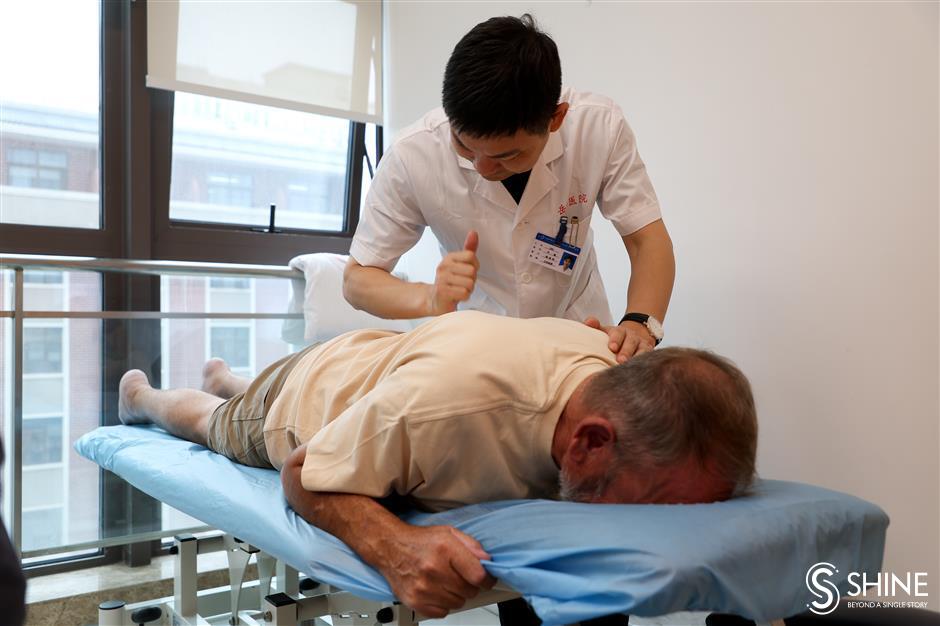
Dr Yan Zhen from Shanghai Yueyang Hospital of Integrated Traditional Chinese and Western Medicine offers tuina on the UK patient, who go all the way for medical diagnosis and treatment.
In the following days, Johnston took his stepfather to Shanghai Yueyang Hospital of Integrated Traditional Chinese and Western Medicine for acupuncture and tuina for the spine problem.
"The medical service in Shanghai is very convenient and efficient," he said.
His stepfather left Shanghai after the two-week trip with a satisfactory health-care experience.
It is a typical case of international medical tourism boosted by the Shanghai government, which has launched a pilot scheme to encourage local hospitals to step up efforts in offering international medical tourism products and streamlined health services.
To build Shanghai into a medical center in Asia, the Shanghai Health Commission has designated 13 leading public hospitals and 20 private hospitals as pilot facilities, which, especially the public ones, have outstanding medical capabilities, innovative practices, and foreign service experiences.
"Local hospitals are facing a big market of expatriates living in China and those taking a trip here," Vice Mayor Chen Yujian told a meeting on international medical tourism last month.
"Enhancing service ability for international patients can not only expand Shanghai's opening-up but also boost our business environment. It is a very important measure to build Shanghai's international image to attract more high-quality talent, enterprises and investment home and abroad."
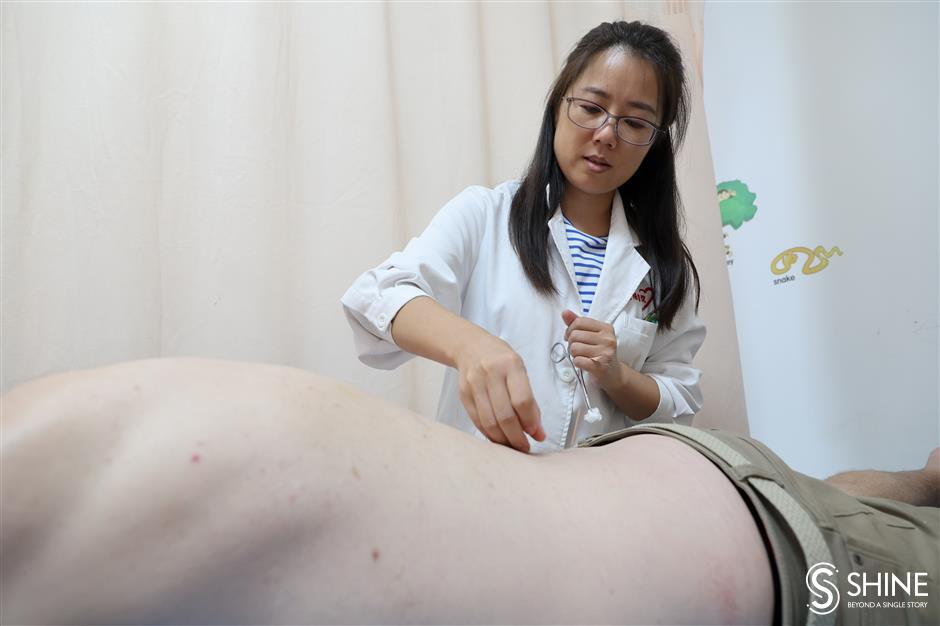
Dr Jiao Zhihua from Yueyang Hospital gives acupuncture therapy to release pain.
Responding to the call, all the 13 public hospitals in the scheme and many other leading public hospitals have set up international medicine departments to improve their service quality for international patients as well as Chinese patients with commercial medical insurancen and higher demand.
The city government has planned to team up with the local health commission and administration of culture and tourism to encourage tourism agencies to develop new medical tourism packages, in an effort to push Shanghai as a destination for international medical tourism.
To regulate the practice and enhance the quality of international medical services, Shanghai issued the nation's first standard on international medical service, which was enacted from this month.
According to Dr Gu Jingwen from Huashan Hospital and a drafter of the standard, international medicine doesn't only mean VIP service but high-quality service in line with international practice.
"It is not only medicine but an integrated field with medicine, management, tourism, service and insurance," she said.
"Language ability, medical capability, service and details like respect to different dietary habits and cultural backgrounds are all included into the criteria of international medicine service. Good international medicine service should meet patients' diversified, individualized and different levels of demand."
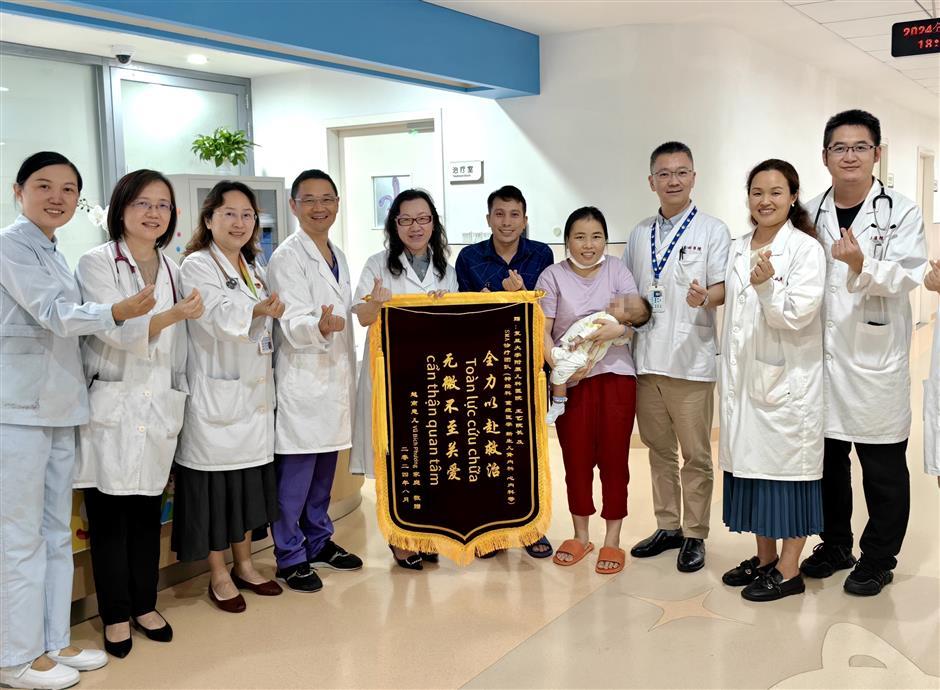
A Vietnamese couple take pictures with medical staff from the Children's Hospital of Fudan University in Shanghai after a successful treatment of their baby girl.
Local public hospitals said boosting international medicine offers them more incentives and opportunities.
"Our hospital included international commercial insurance into our billing system three years ago and set up English training course for medical staff to enhance their ability on international patients," said Dr Zhou Jia, president of Yueyang Hospital.
"It is common to see expatriate patients in the hospital nowadays."
Local doctors said the quick and efficient service always astonishes expatriate patients.
"I received a Spanish patient in the emergency department one night," said Dr Zhao Qing at Yueyang Hospital.
"He suffered pain, and the nurses called me as I am rehabilitation expert. After checking his condition, I arranged the appropriate doctor for treatment and returned to my office. To my surprise, he asked the nurse to call me to express his gratitude in person before leaving the hospital and said the service is much more efficient than his home country."
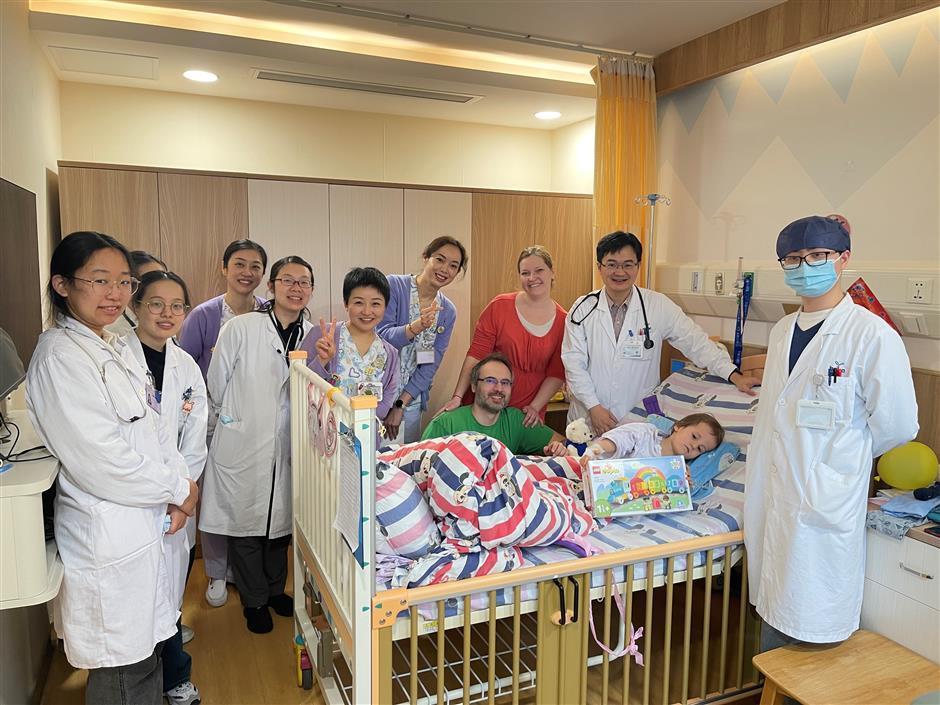
A two-year-old Polish boy, with his family and medical staff at Shanghai Children's Medical Center.
Many foreign patients with serious or complicated problems also travel all the way to Shanghai for diagnosis and treatment.
"Our hospital has received patients from countries like Russia and Singapore and regions like Hong Kong and Macao coming all the way here for CAR-T therapy for cancer because of its competitive cost and high quality in the city," said Dr Wu Haishan, president of Jiahui International Hospital, a private hospital in the pilot scheme.
Thanks to the development of domestic CAR-T products, the medical expenses for CAR-T therapy in China is much cheaper than overseas. The total expense is only about one third that in the United States, experts explained.
"Boosting international medical service helps make Shanghai more well-known to expatriates and expands the total market for both public and private hospitals with international competence," Wu said.
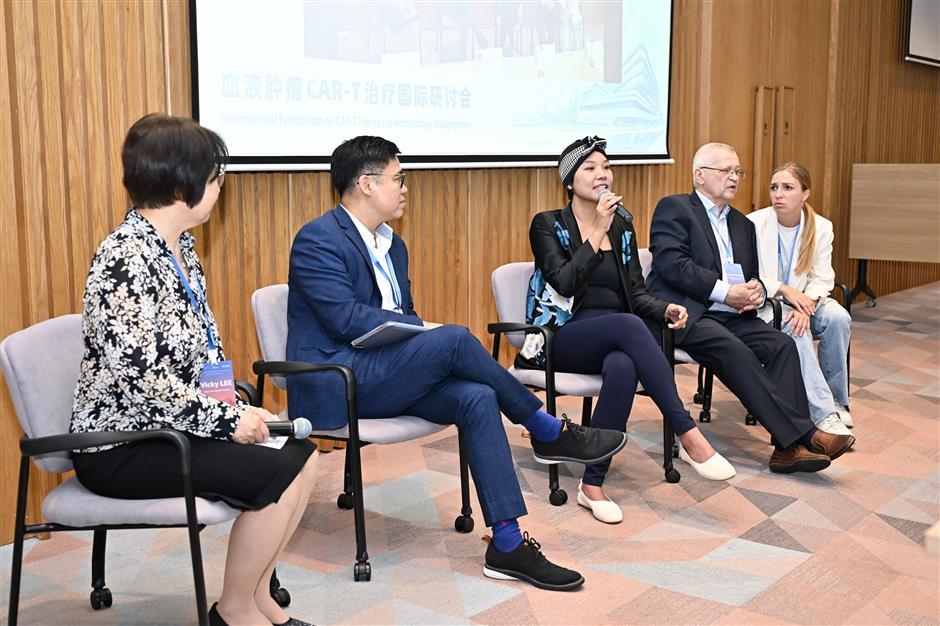
A woman from Singapore (third from right) and Borzenkov Vladimir from Russia (second from right) share their feeling at a medical seminar in May after receiving successful CAR-T treatment in Jiahui.
Source: Shanghai Daily

